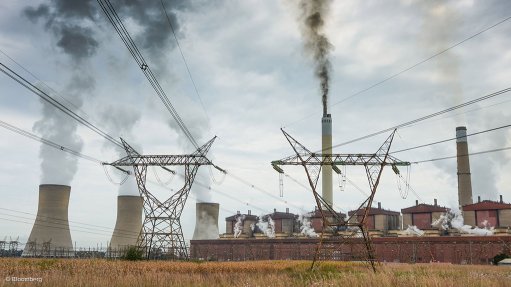SKA Observatory contracts worth hundreds of millions or euros already awarded
The SKA Observatory (SKAO), the international organisation responsible for the implementation and operation of the square kilometre array radio telescope project, has already awarded 46 major contracts with a total value of €474-million. And work on the site of the SKA-Mid (middle frequency range) element of the instrument, which is hosted by South Africa, started on Monday.
“Off-site construction work started in July 2021,” SKAO deputy director-general and head of programmes Dr Joe McMullin tells Engineering News in an exclusive interview. “Since then, we’ve been busy awarding contracts, getting supply chains established, and starting the manufacture of components and subsystems. But now, we’ve started work on site, and that’s really exciting.”
Currently, and for months to come, the work at the SKA-Mid site in the Karoo region of the Northern Cape province will be composed of civil engineering operations – the creation of the infrastructure required by the instrument. The SKA-Mid will be co-located with, and absorb, South Africa’s own 64-dish MeerKAT radio telescope array.
In Australia, which will host the low-frequency range element of the SKA (known as SKA-Low), the SKAO now has access to the chosen site, meaning that it can now undertake site surveys and other such activities. However, it cannot yet start the civil engineering works, as final regulatory approvals are still pending. They are expected to be issued by the start of February, and work will start as soon as they are released.
“We have a head start in South Africa, due to the MeerKAT extension project, which is part-funded by Germany’s Max Planck Institute,” he highlights. “We were able to leverage this to start establishing foundations for the SKA dishes. The foundation for the first SKA dish has already been built.”
SKA-Mid will comprise 197 dishes, composed of 133 new dishes plus the 64 existing MeerKAT dishes. The first of the new SKA dishes is expected to be built and fully equipped, but not yet tested and commissioned, during the third quarter of next year. This first dish has already been ordered, from a Chinese contractor. (All the first batch of the SKA dishes will be built in China, which is a member of the SKAO.)
“By the end of 2024, we’ll have four dishes completed, with feeds installed and being used for testing – a micro-SKA,” he reports. “The SKA is an interferometer, and we can test nearly all the SKA systems with such a small number of dishes. As each dish is completed, it will be commissioned and undergo science verification. The entire array is expected to start early operations by July 2028.”
Although the SKAO was only established in 2019, the world has already changed dramatically since then, with a pandemic, a major interstate war which is having global repercussions, and a significant global economic slowdown. The SKAO was set up as an intergovernmental organisation precisely to try and ensure stable financing. But of the 16 countries that indicated that they would participate in the SKA, only eight have so far joined the SKAO. (They are Australia, China, Italy, the Netherlands, Portugal, South Africa, Switzerland and the UK.) On the other hand, some of the interested countries which have not yet actually joined the SKAO have nevertheless already contributed funding for it.
The overall design commitment for funding is €2-billion, under 2021 economic conditions. (With each passing year, this number is increased by the inflation rate.)
“We can’t be certain we’ll get all the money we need, but we’re hopeful,” says McMullin. “We do have enough front-loaded funding for our work through to 2025, especially the engineering design, development and qualification of the system in the field, and developing and establishing logistics support and so on. From 2025, we’ll need annual funding inflows, but, hopefully, by then the international situation will allow for this further funding."
Currently, the SKA project is on course and on schedule.
Comments
Announcements
What's On
Subscribe to improve your user experience...
Option 1 (equivalent of R125 a month):
Receive a weekly copy of Creamer Media's Engineering News & Mining Weekly magazine
(print copy for those in South Africa and e-magazine for those outside of South Africa)
Receive daily email newsletters
Access to full search results
Access archive of magazine back copies
Access to Projects in Progress
Access to ONE Research Report of your choice in PDF format
Option 2 (equivalent of R375 a month):
All benefits from Option 1
PLUS
Access to Creamer Media's Research Channel Africa for ALL Research Reports, in PDF format, on various industrial and mining sectors
including Electricity; Water; Energy Transition; Hydrogen; Roads, Rail and Ports; Coal; Gold; Platinum; Battery Metals; etc.
Already a subscriber?
Forgotten your password?
Receive weekly copy of Creamer Media's Engineering News & Mining Weekly magazine (print copy for those in South Africa and e-magazine for those outside of South Africa)
➕
Recieve daily email newsletters
➕
Access to full search results
➕
Access archive of magazine back copies
➕
Access to Projects in Progress
➕
Access to ONE Research Report of your choice in PDF format
RESEARCH CHANNEL AFRICA
R4500 (equivalent of R375 a month)
SUBSCRIBEAll benefits from Option 1
➕
Access to Creamer Media's Research Channel Africa for ALL Research Reports on various industrial and mining sectors, in PDF format, including on:
Electricity
➕
Water
➕
Energy Transition
➕
Hydrogen
➕
Roads, Rail and Ports
➕
Coal
➕
Gold
➕
Platinum
➕
Battery Metals
➕
etc.
Receive all benefits from Option 1 or Option 2 delivered to numerous people at your company
➕
Multiple User names and Passwords for simultaneous log-ins
➕
Intranet integration access to all in your organisation
















